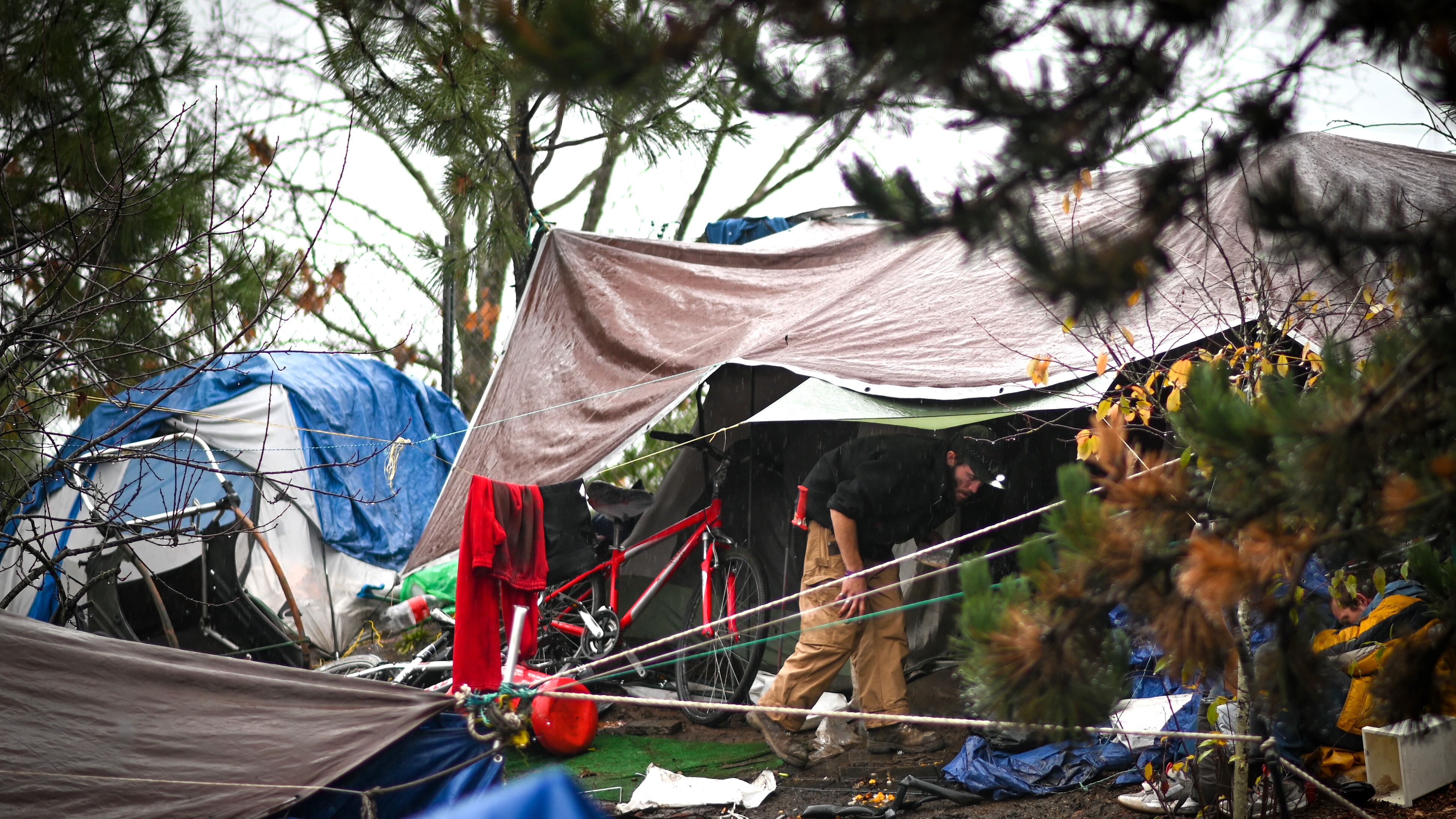People for Portland, the political advocacy group funded by business interests seeking to clean up the city, today filed paperwork to put a initiative on the November ballot in the three metro-area counties requiring local governments to direct existing tax dollars to fund emergency shelter beds and to compel cities to enforce anti-camping laws.
The group seeks to redirect money from a three-county tax passed by voters in 2020 that is expected to raise about $250 million a year for homeless services. The measure would require the three counties receiving those tax dollars to dedicate at least 75% of the existing revenue to emergency shelters until the supply of shelter beds meets demand in each county.
It would also require cities to enforce their own anti-camping ordinances to be eligible for long-term funding, force an annual audit of all spending, and seek to prevent conflicts of interest on the oversight board.
That proposal amounts to a hostile takeover of the measure’s spending—especially in Multnomah County, where elected officials have hewed to a “housing first” model. It also would compel people living on the streets to move into shelters, a longtime ambition of many Portland business leaders.
“We don’t need more money. We don’t need different laws,” People for Portland said in a statement announcing the measure. “We just need what this community was promised two years ago when we approved the Metro Homeless Services Measure—to end the humanitarian crisis on our streets.”
In recent months, the drumbeat to sweep homeless camps and force their residents into shelters has grown, fueled by Portland Business Alliance polling numbers that show 8 in 10 Portlanders would applaud such a policy. Last month, WW broke news of a memo crafted by a mayoral staffer that outlined a strategy to create massive outdoor camps and outlaw urban camping.
Several contests on the May ballot—including the race for Multnomah County chair—were already essentially proxy battles over these questions. Now People for Portland intends to take the matter directly to voters, launching what could be a bitter philosophical battle over the region’s most vexing issue.
The money that People for Portland seeks to redirect comes from a 1% income tax on individuals in Multnomah, Clackamas, and Washington counties making more than $125,000 a year and couples making $200,000, and from a 1% tax on profits from businesses with gross receipts of more than $5 million. The tax remains in effect until 2031 and is expected to raise a total of $2.5 billion. It is managed by Metro, the three-county governing body.
As it stands, the money is allocated to outreach and shelter, placement in housing, rent assistance, advocacy and case management, and services in mental health, education, addiction and employment. On its website, Metro says the goals for the program are to “connect 5,000 chronically homeless households with supportive housing and stabilize 10,000 households at risk of or experiencing homelessness in permanent housing.”
The debate over whether to seek more shelter beds has been particularly acute in Multnomah County, where Chair Deborah Kafoury has been criticized for seeking more units of permanent housing at the expense of beds. Mayor Ted Wheeler, County Commissioner Sharon Meieran, and businessman Jordan Schnitzer have all said local government should act with greater urgency and devote more money to shelter beds.
Andy Miller, executive director of Human Solutions, a homeless services nonprofit, says that by requiring cities to enforce camping laws in order to get funding, the People for Portland measure is an attempt to re-criminalize homelessness under the guise of helping homeless people.
“They’re proposing a take-it-or-leave-it-approach of going to a shelter or not,” Miller said in an interview. “Shelters don’t work for everyone. We have data showing that when people are forced into shelters, it often doesn’t work, and they leave. Clearing camps and forcing people into shelters reduces the visibility of homelessness, not the reality of homelessness.”
Mayoral spokesman Rich Chatman said Mayor Ted Wheeler hasn’t seen the People for Portland proposal. “He is considering all options, so long as they are intent on finding humane shelter options that our residents will voluntarily use,” Chatman said in an email. “He is not interested in criminalizing homelessness.”
Neil Simon, a spokesman for Metro, said employees at the agency couldn’t comment on the proposed measure. (Separately, in the first six months of the supportive housing effort, he said, Metro has added 1,640 shelter beds, placed 2,021 people into permanent, stable housing, and provided eviction-prevention assistance to another 1,406.)
A media representative for Multnomah County didn’t immediately return an email seeking comment.
People for Portland said its polling shows strong support in all three counties, across partisan lines, to direct funding toward safe shelters (74%) and to require people currently living on the streets to use shelters when available (59%). Polls done for the Portland Business Alliance show “overwhelming public support to require people currently living outside to sleep in shelters or designated camping areas (83%),” People for Portland said.
People for Portland has been relentlessly critical of the metro area’s response to homelessness. Today, it said they it was acting in part because local officials have so far distributed just 28 emergency housing vouchers out of 476 made available by the U.S. government last May to pay rent for people who are homeless or on the verge of becoming so.
“Every night uncounted thousands of people go to sleep outside or in cars in the Metro area,” People for Portland said in its statement. “But nothing will happen quickly without the public demanding it and funding being prioritized to directly meet the need.”
Sophie Peel contributed reporting to this story.

